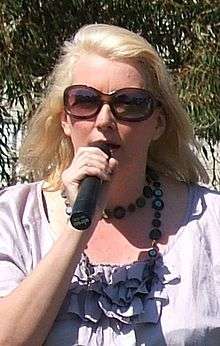Tammy Franks
| Tammy Franks | |
|---|---|
 | |
| Member of the South Australian Legislative Council | |
|
Assumed office 20 March 2010 | |
| Personal details | |
| Political party | SA Greens |
| Website | TammyFranks.org.au |
Tammy Anne Franks, formerly Jennings, is an Australian politician who was elected to the South Australian Legislative Council for the SA Greens at the 2010 state election.[1]
Early life
Born in Dubbo and raised largely in seaside suburban Sydney, Franks completed her final year of high school at Parafield Gardens before attending the University of South Australia where she studied Sociology, Australian Studies and Community Arts. Franks became heavily involved in university politics, media, and activism, campaigning against the closure of her Salisbury Campus of the University of South Australia, and was elected State President of the National Union of Students.[2]
Career
Then prime minister Paul Keating famously told Franks, protesting in 1996, to "get a job".[3]
Franks has since worked in community organisations such as Amnesty International and the YWCA and held such positions such as Policy Officer for the Mental Health Coalition of South Australia.
Political career
Franks was the Higher Education and Youth Advisor for Democrats Senator Natasha Stott Despoja in 1995 and undertook a secondment to the 'Yes' campaign for the Australian Republic Movement under the leadership of Malcolm Turnbull during the Australian Republic Referendum campaign.
In 2004 Franks ran as a Democrat Senate candidate in South Australia.[4]
Franks has been active in the South Australian Greens since 2006, serving two terms as State Convenor and undertaking the task of SA Election Campaign Committee Convenor for the 2007 federal election.[2]
At the 2010 state election, Franks achieved 6.6 percent of the statewide vote, an increase of 2.3 percent, joining fellow Green Mark Parnell in the state Legislative Council.
Tax return failure
It was reported in October 2011 that Franks had not lodged 10 tax returns since 2001, facing a maximum fine of $41,000.
Franks pleaded guilty on 28 October 2011 to ten counts of failing to lodge tax returns between 2001 and 2010, but later changed her plea to not guilty in March 2012. Franks said she had always paid tax, always provided a tax file number and did not owe the Australian Taxation Office any money, and that the failure to lodge was due to her belief that if she was owed money, she wouldn't be required to lodge a tax return. She also cited a combination of personal factors, including a "nasty divorce".[5] Franks further claimed that when the ATO had asked her to file her returns, they gave her only six weeks to respond, and she had been unable to access each of her group certificates or joint bank accounts, as they were scattered in boxes throughout the house and in a locked shed of the marital home which was owned by her then-husband. She claimed she did not realise the ATO would accept statutory declarations in place of missing or lost group certificates.
Lawyers for the Commonwealth Director of Public Prosecutions, said Franks should be fined the maximum amount of $41,800.
The magistrate said she would consider the matter and review the now-lodged tax returns before imposing a sentence.[3]
Franks was convicted on 8 October 2012.[6] The magistrate rejected Franks's evidence that she had been unable to comply with a final notice because she could not get the relevant details. While the magistrate had great sympathy for her personal circumstances at the time she received the final notice, he found there were avenues available to her to obtain the information. The magistrate concluded Franks "did very little" to attempt to comply with the notice. Describing her as a "disorganised person" and "not an impressive witness", the Magistrate said Franks tended to blame others, including the Australian Tax Office, for her situation. He said he preferred the evidence of an ATO employee, who contradicted Franks' evidence that she had asked for an extension of time in which to lodge the returns.
The Magistrates fined Franks $6600 and ordered her to pay $7,500 court costs. A conviction was recorded because of the seriousness of the offending, but she will be able to keep her seat in parliament, because they were not indictable offences.[7]
See also
References
- ↑ Statement of results for the Legislative Council: 2010 state election – ECSA
- 1 2 "About Tammy Franks".
- 1 2 Taxing time lands MLC in hot water: AdelaideNow 29 October 2011
- ↑ "Tammy Franks ten-year time out on tax".
- ↑ MP blames her tax file failure on belief in an urban myth: The Australian 29 October 2011
- ↑ Franks found guilty
- ↑ "Greens MP Tammy Franks fined $6600 for failing to lodge tax returns".
External links
- Parliament profile
- TammyFranks.org.au – official site
- Tammy Franks speech: Greens Dinner 14 November 2009 (Video: Part 1) – (Part 2)